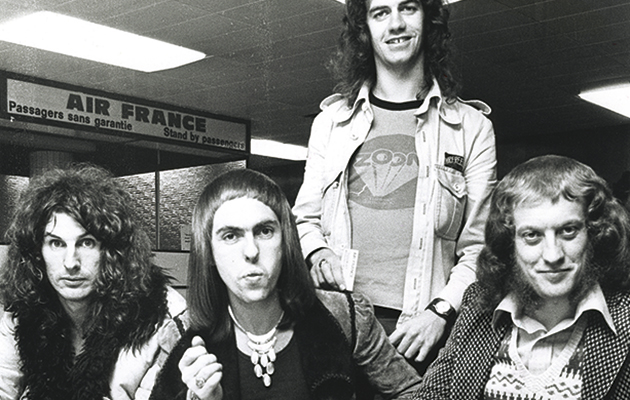It’s funny how some bands only make sense in certain eras. If they’re like Slade, they seize the window of opportunity and don’t question it. The four Black Country boys – as daft as brushes and as hard as nails – were a struggling outfit with a serious image problem when the 1970s dawned. By the end of the decade they were forgotten, ruefully acknowledging the winds of change on their 1977 album Whatever Happened To Slade. But in between, as Britain looked towards zanily dressed pop stars to take its mind off the Common Market and the OPEC oil crisis, Slade found themselves spectacularly in vogue. They rocketed up the charts with one infectious hit after another, effectively becoming the nation’s favourite band. With their mirrored top hats and stack heels, they were a perfect primary-colour mix. Salt-of-the-earth and larger-than-life.
Slade’s songs were spelt like ruminations in a Molesworth jotter (“Look Wot You Dun”, “Mama Weer All Crazee Now”), and combined the shrill sparkle of glam-rock with the lung-busting euphoria of Lennon’s “Everybody’s Got Something To Hide Except Me And My Monkey”. As lead guitarist Dave Hill noted, Slade could switch from pop to rock’n’roll at a moment’s notice. “It was great having a thick, dirty song up at Number 1,” he said of their 1972 chart-topper “Take Me Bak ’Ome” – and sure enough, when we compare its riff to contemporaneous glam like T.Rex’s “Telegram Sam” or the Sweet’s “Wig-Wam Bam”, Slade’s guitars do indeed sound thicker and dirtier. “Take Me Bak ’Ome” oozes grime. To think it knocked Don McLean’s fastidious “Vincent” off the top spot.
Slade’s legacy as four merry clowns getting exuberant in a fancy dress shop is a pejorative one, and does their music a real disservice. As we hear time and again on When Slade Rocked The World 1971-1975 – a vinyl-and-CD, collector-aimed boxset focusing on four albums and eight non-album singles – they weren’t just churning out chart fodder to fill the nostalgic dancefloors of future school discos. They were better musicians than that for a start; a tight, syncopated four-piece, they could swing viciously and attack with force. Slayed? (1973) is a relentless LP in places, stomping and shrieking at a level of near-hysteria even before it gets to the famously berserk “Mama Weer All Crazee Now”. And connoisseurs of gripping live albums rarely fail to mention Slade Alive! (1972), an intimate fan-club performance that saw Slade put aside the instruments that had coloured their recent singles – piano on “Look Wot You Dun” and gypsy violin on “Coz I Luv You” – and simply plug in, turn the amps up and pin their delirious audience to the walls of a small Piccadilly studio. Containing some well-chosen covers and not a single overdub, Slade Alive! has been compared to the MC5’s Kick Out The Jams without the politics. If it has anything as pretentious as a philosophy, it’s as simple as this: here’s a song to get you on your feet, and here’s another one to get you leaping about. “We’re only interested in entertaining and giving our audiences a good time,” Hill remarks to George Tremlett in The Slade Story, a 1975 paperback included as part of this boxset’s packaging. Tremlett, a seasoned pop journalist who interviewed Slade several times, provides a cheerful account of their rise to fame. These lads are keeping their feet on the ground, don’t worry. At the time of publication, Hill had just bought a Jensen sports car and was thinking of opening a chain of boutiques.
Slade’s music was undergoing a lot of change by then, softening their abrasive edges. A wistful ballad, “Everyday”, came as a shock in 1974 – though its follow-up, “The Bangin’ Man”, which appears here on one of four double-A-sided 45s, was a return to raucous rock. But with hindsight it’s clear that the Holder-Lea songwriting partnership, once invincible, was starting to falter. Old New Borrowed And Blue (1974) may have earned an instant gold disc, but it’s a patchy affair that seems to lose confidence in itself as it goes along. How do we diversify? How do we mature? Music hall? More ballads? As for the leapers and rockers, only on “Do We Still Do It” – a year earlier, the title would have been presented as a statement rather than a question – do Holder and Lea come up with something powerfully new. Were they listening to Slade records in Akron, Ohio? Three years later, the descending riff on Devo’s “Jocko Homo” would prove uncannily similar.
The final album in the box is Slade In Flame, a gritty soundtrack to a 1975 feature film in which each Slade member took an acting role. No stack-heeled star bought any boutiques in this bleak study of the British music industry; the atmosphere was closer to Get Carter than glam-rock. The standout song, “How Does It Feel”, is an epic illustration of what a brave step Slade were taking. Haunted and scared, Holder’s voice was like nothing he’d given his fans before. Slade had found their maturity, but at a cost. Within two years, their singles would be charting at 32 and 48. When Slade Rocked The World elects not to go there, unable to stomach such a mortifying decline.
You can pre-order When Slade Rocked The World from Amazon.co.uk by clicking here
The History Of Rock – a brand new monthly magazine from the makers of Uncut – a brand new monthly magazine from the makers of Uncut – is now on sale in the UK. Click here for more details.
Uncut: the spiritual home of great rock music.



